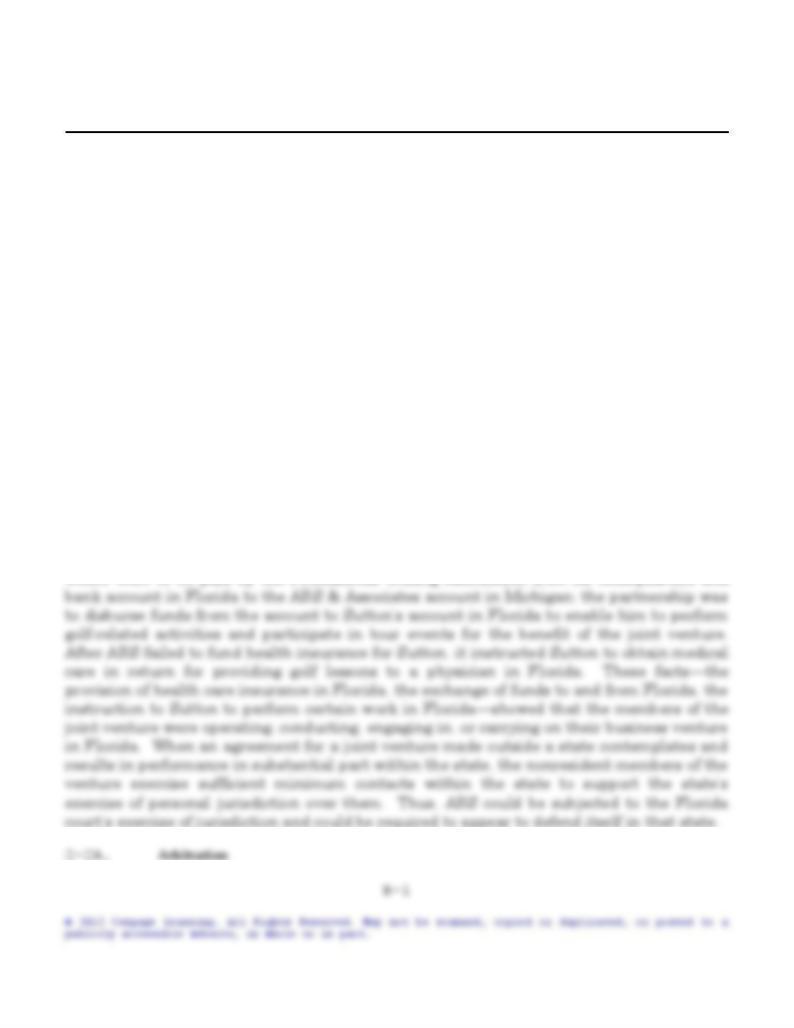
ALTERNATE CASE PROBLEM ANSWERS
CHAPTER 2
COURTS AND ALTERNATIVE
DISPUTE RESOLUTION
2-1A. Jurisdiction
(Chapter 2—Pages 30–32)
A court can exercise personal jurisdiction over nonresidents under the authority of a long
arm statute. Under a long arm statute, it must be shown that the nonresident had suffi-
cient contacts with the state to justify the jurisdiction. In regard to business firms, this
requirement is usually met if the firm does business within the state. In this case, the
parties to the sponsorship agreement contemplated that substantial activities to further
their joint venture would take place in Florida. Sutton lived in Florida, and he was ex-
pected to and did play in tour events in Florida. Sutton was to be provided health care in-
surance in Florida. All earnings from Sutton’s golf-related activities in Florida and else-
where were to be paid by the Professional Golfing Association from its headquarters and
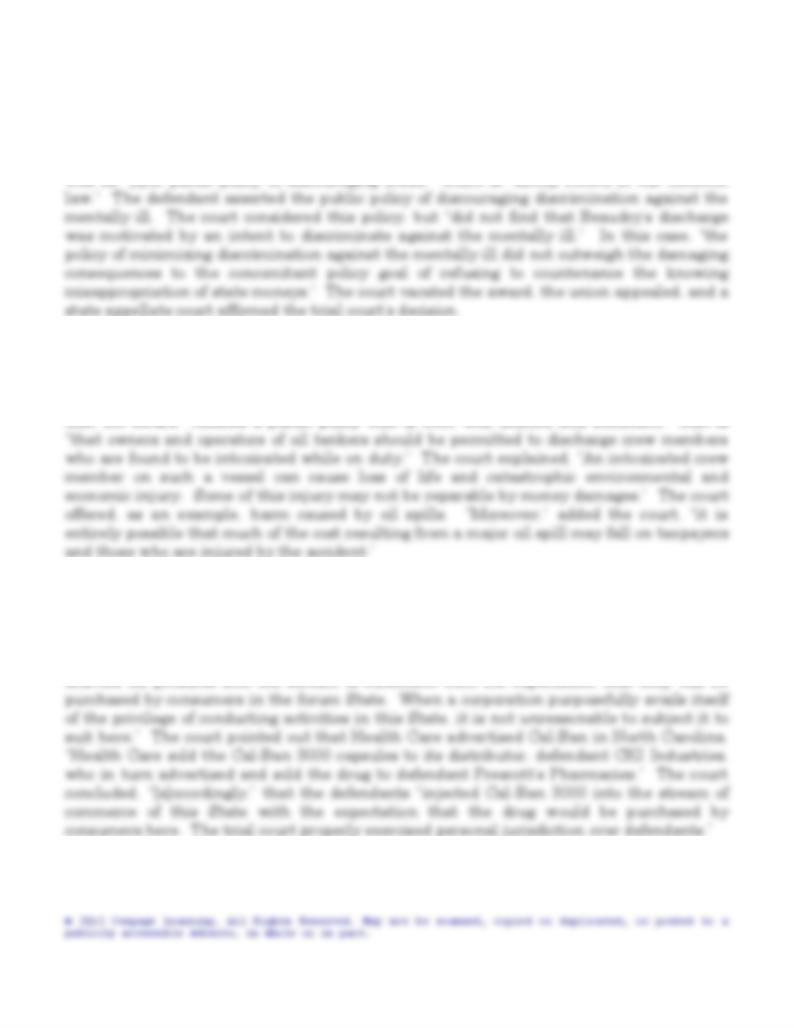
B-2 APPENDIX B: ALTERNATE CASE PROBLEM ANSWERS—CHAPTER 2
(Chapter 2—Pages 43–44)
The public policy that the court weighed in making its decision included the policy of “not
tolerating the knowing misappropriation of state funds by state officials or employees,” as
well as “[t]he public policy of discouraging fraud,” which is “firmly rooted in our common
2-3A. Arbitration
(Chapter 2—Pages 43–44)
The U.S. Court of Appeals for the Third Circuit held that the arbitration award, requiring
Exxon to reinstate Fris, should be vacated as contrary to public policy. The court reasoned
that the award “violates a public policy that is both well defined and dominant,” that is
2-4A. Jurisdiction
(Chapter 2—Pages 30–32)
The North Carolina state court held that it had personal jurisdiction over the Florida de-
fendants. On appeal, the North Carolina Court of Appeals agreed. The appellate court
initially pointed out that a court can assert “personal jurisdiction over a corporation that
delivers its products into the stream of commerce with the expectation that they will be
2-5A. Standing to sue
(Chapter 2—Pages 35–37)
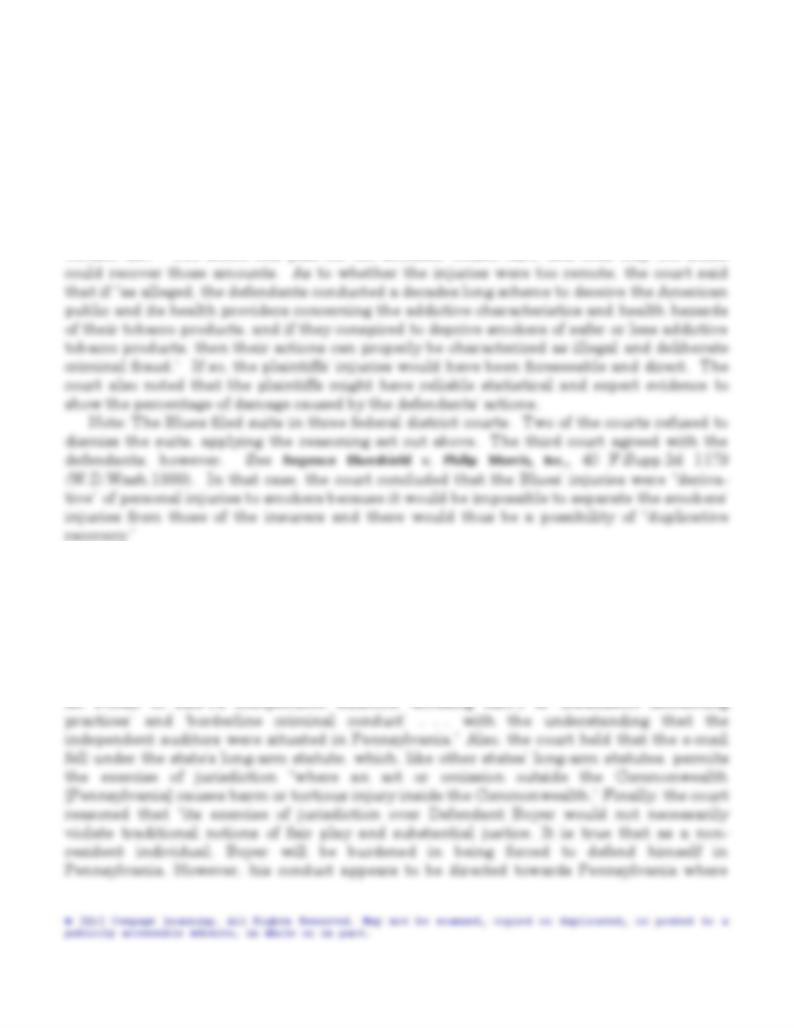
APPENDIX B: ALTERNATE CASE PROBLEM ANSWERS—CHAPTER 2 B-3
The court held that the Blues had standing and denied the tobacco companies’ motion to
dismiss the case. The defendants argued in part that any injury to the plaintiffs was in-
direct and too remote to permit them to recover, and that it would be too difficult to deter-
mine whether the plaintiffs’ injuries were due to the defendants’ conduct or to intervening
third causes. The court reasoned that the damages claimed in this case were separate from
the damages suffered by smokers. The plaintiffs “seek recovery only for the economic
burden of those medical claims and procedures which they directly paid as a result of
tobacco use.” The Blues had paid for the smokers’ health care, and thus only the Blues
2-6A. E-Jurisdiction
(Chapter 2—Pages 33–34)
The court denied Boyer’s motion to dismiss the complaint for lack of personal jurisdiction.
“[T]he likelihood that personal jurisdiction can be constitutionally exercised [in the context
of Internet activities] is directly proportionate to the nature and quality of commercial
activity that an entity conducts over the Internet.” Boyer “posted Internet messages on the
Yahoo bulletin board, which included negative information regarding ABFI.” He “also sent
an e-mail to ABFI’s independent auditors, accusing ABFI of ‘fraudulent accounting
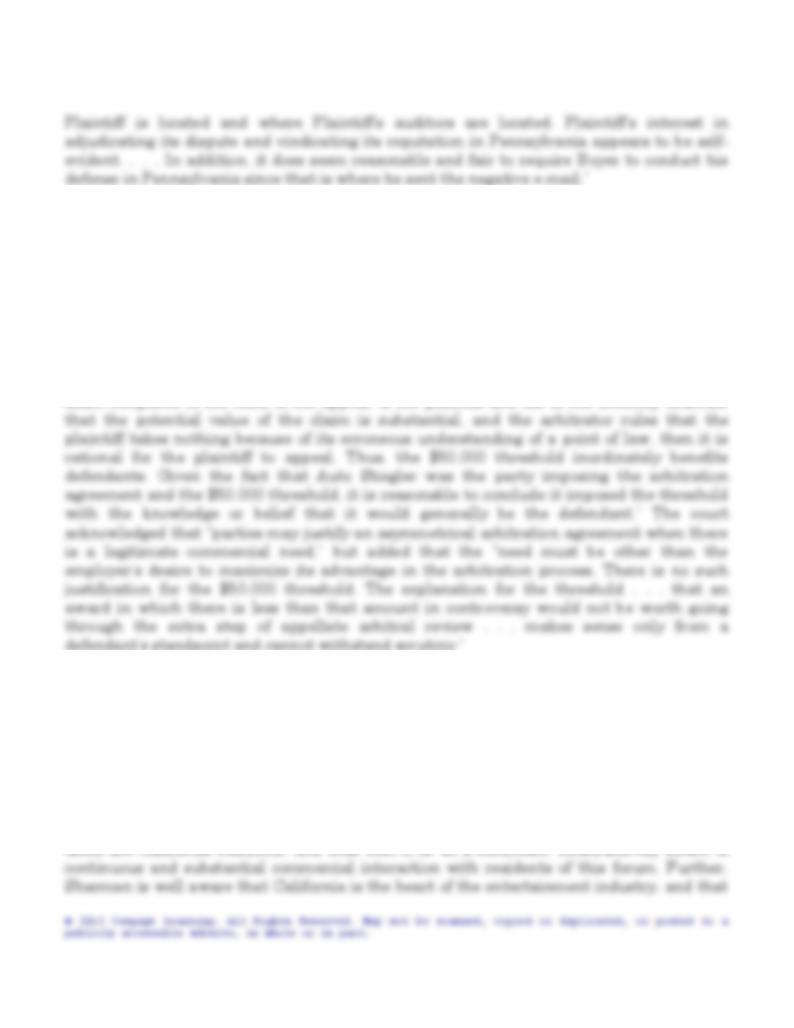
B-4 APPENDIX B: ALTERNATE CASE PROBLEM ANSWERS—CHAPTER 2
2-7A. Arbitration
(Chapter 2— Pages 43–44)
The court denied Auto Stiegler’s motion. A state intermediate appellate court reversed this
ruling, and Little appealed to the California Supreme Court, which held that the appeal
provision was unenforceable but which also held that the provision could be cut from the
agreement and the agreement could then be enforced. Auto Stiegler argued in part that the
“provision applied evenhandedly to both parties.” The court stated, “[I]f that is the case,
[the defendant fails] to explain adequately the reasons for the $50,000 award threshold.
From a plaintiff’s perspective, the decision to resort to arbitral appeal would be made not
according to the amount of the arbitration award but the potential value of the arbitration
claim compared to the costs of the appeal. If the plaintiff and his or her attorney estimate
2-8A. Jurisdiction
(Chapter 2— Pages 30–32)
The court denied Sharman’s motion to dismiss. The court explained that “fairness consists
principally of ensuring that jurisdiction over a person is not exercised absent fair warning
that a particular activity may subject that person to the jurisdiction of a foreign sovereign.”
Thus, “the touchstone constitutional inquiry is whether the defendant’s conduct and
connection with the forum State are such that he should reasonably anticipate being haled
into court there.” In this case, “Sharman provides its KMD software to millions of users
every week . . . . Sharman has not denied and cannot deny that a substantial number of its
users are California residents, and thus that it is, at a minimum, constructively aware of
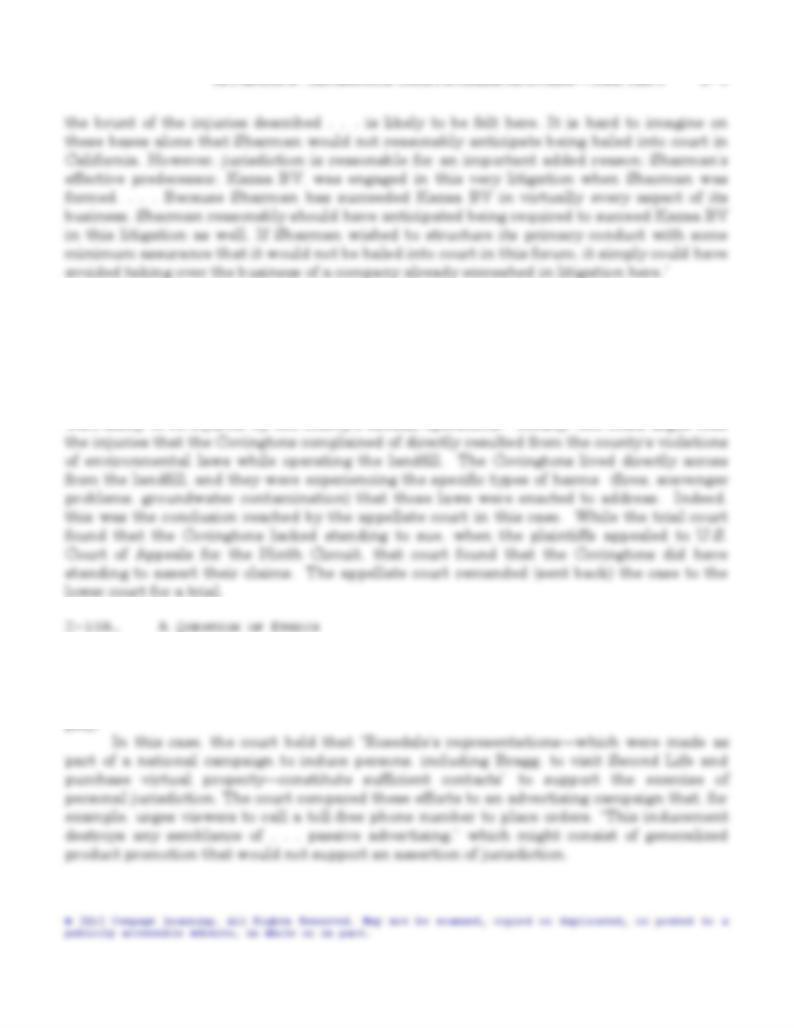
APPENDIX B: ALTERNATE CASE PROBLEM ANSWERS—CHAPTER 2 B-5
2-9A. Standing to sue
(Chapter 2— Pages 35–37)
This problem concerns standing to sue. As you read in the chapter, to have standing to sue,
a party must have a legally protected, tangible interest at stake. The party must show that
he or she has been injured, or is likely to be injured, by the actions of the party that he or
she seeks to sue. In this case, the issue is whether the Covingtons had been injured, or
were likely to be injured, by the county’s landfill operations. Clearly, one could argue that
1. A court can generally exercise personal jurisdiction over a defendant that has
had minimum contacts with the forum “necessary to have reasonably anticipated being
haled into court there.” After minimum contacts have been established, a court can consider
whether the exercise of personal jurisdiction comports with “traditional conceptions of fair
play.”
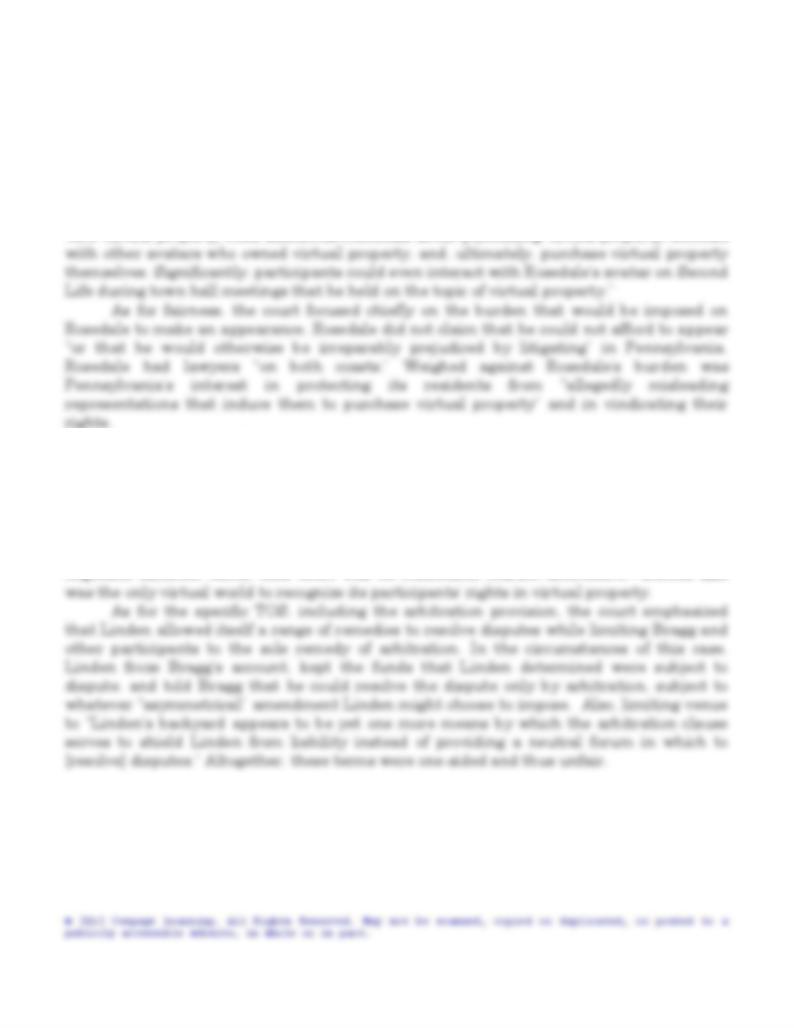
B-6 APPENDIX B: ALTERNATE CASE PROBLEM ANSWERS—CHAPTER 2
It was the interactive nature of the marketing scheme, not the Web site, on which the
court based its holding. “Rosedale's personal role was to bait the hook for potential
customers to make more interactive contact with Linden by visiting Second Life's website.
Rosedale's activity was designed to generate additional traffic inside Second Life. He was
the hawker sitting outside Second Life's circus tent, singing the marvels of what was
contained inside to entice customers to enter. Once inside Second Life, participants could
view virtual property, read additional materials about purchasing virtual property, interact
2. Under the Federal Arbitration Act (FAA), a court must compel the arbitration
of a dispute if there is a valid agreement to arbitrate that covers the dispute. In this case,
the court focused primarily on the validity of the agreement.
A critical factor was the manner in which Linden presented the “Terms of Service”
(TOS). A participant was effectively told to “take it or leave it”—one who declined could not
gain access to Second Life. There was no opportunity for negotiation so that even a
participant like Bragg, who was an experienced attorney, could not use his or her skills to
negotiate different terms. And there was no reasonable market alternative—Second Life